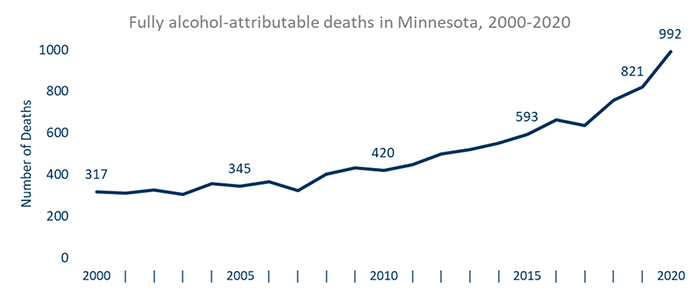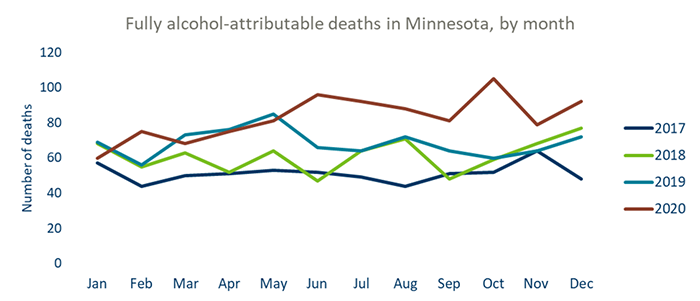Preventable deaths from alcohol use increased in 2020
News Release April 15, 2021
New preliminary data show that nearly a thousand Minnesotans died from alcohol use last year.
The preliminary data suggest that factors related to the pandemic may have boosted a decades-long trend of increasing numbers of alcohol-attributable deaths in Minnesota. The number of fully alcohol-attributable deaths increased by one-third between 2000 and 2010, and more than doubled between 2010 and 2020. Fully alcohol-attributable deaths would not have happened if alcohol had not been consumed. This includes both chronic causes, such as alcohol-related liver disease, and acute causes, such as alcohol poisoning. In 2020, 992 Minnesotans died from fully alcohol-attributable causes.

“The deaths of so many Minnesotans from alcohol is tragic and preventable,” said Minnesota Commissioner of Health Jan Malcolm. “Sadly, the pandemic has amplified some of the root causes of substance use and substance use disorders, such as social isolation, job loss and lack of access to treatment. In response, we need to strengthen overall opportunities in our communities for connectedness and financial security as well as specific evidence-based community strategies to reduce excessive alcohol use.”
The deaths from alcohol use in 2020 mirrored similar trends to recent years, until the number of alcohol-attributable deaths started to accelerate in June of last year. This mid-year acceleration is thought to be due in part to factors associated with the COVID-19 pandemic.

“In 2020, we saw that after May, alcohol-related deaths continued to stay elevated and 171 more Minnesotans died in 2020 compared to 2019, which is a larger jump than the trend prior to the pandemic,” said Kari Gloppen, MDH alcohol epidemiologist. Studies show that excessive drinking affects your brain, heart, liver, digestive system and even your immune system. Alcohol is also a carcinogen that has been linked to several types of cancer.”
The data brief, Fully Alcohol-Attributable Deaths in Minnesota, 2000-2020 (PDF), does not include partially alcohol-attributable causes of death for which alcohol was one of several factors contributing to a death. These estimates, therefore, underestimate the impact of alcohol use on deaths in Minnesota. In addition, alcohol-attributable deaths are only the tip of the iceberg as far as the impact of excessive alcohol use. Excessive drinking is costly, both in human and economic terms not just related to premature death, but also chronic diseases, including cancer, injuries and violence, crime, property damage, and lost productivity.
Deaths and other harms from excessive alcohol use are preventable. The Community Preventive Services Task Force, an independent, nonfederal panel of prevention experts, makes evidence-based recommendations at The Community Guide Excessive Alcohol Consumption page on programs and strategies to improve health. Strategies recommended by the group to reduce excessive drinking, and alcohol-related injury, disease and deaths include the following:
- Increase the price of alcohol.
- Regulate the number and concentration in communities of places that sell alcohol.
- Consistent enforcement of laws prohibiting alcohol sales to minors.
- Electronic screening and brief intervention to reduce excessive alcohol use. These screening and brief intervention programs can be integrated into clinic and emergency department services, at workplaces or in other community settings, using mobile devices or computers.
-MDH-
Media inquiries:
Scott Smith MDH Communications 651-503-1440 scott.smith@state.mn.us (preferred)
Legal Disclaimer:
EIN Presswire provides this news content "as is" without warranty of any kind. We do not accept any responsibility or liability for the accuracy, content, images, videos, licenses, completeness, legality, or reliability of the information contained in this article. If you have any complaints or copyright issues related to this article, kindly contact the author above.
